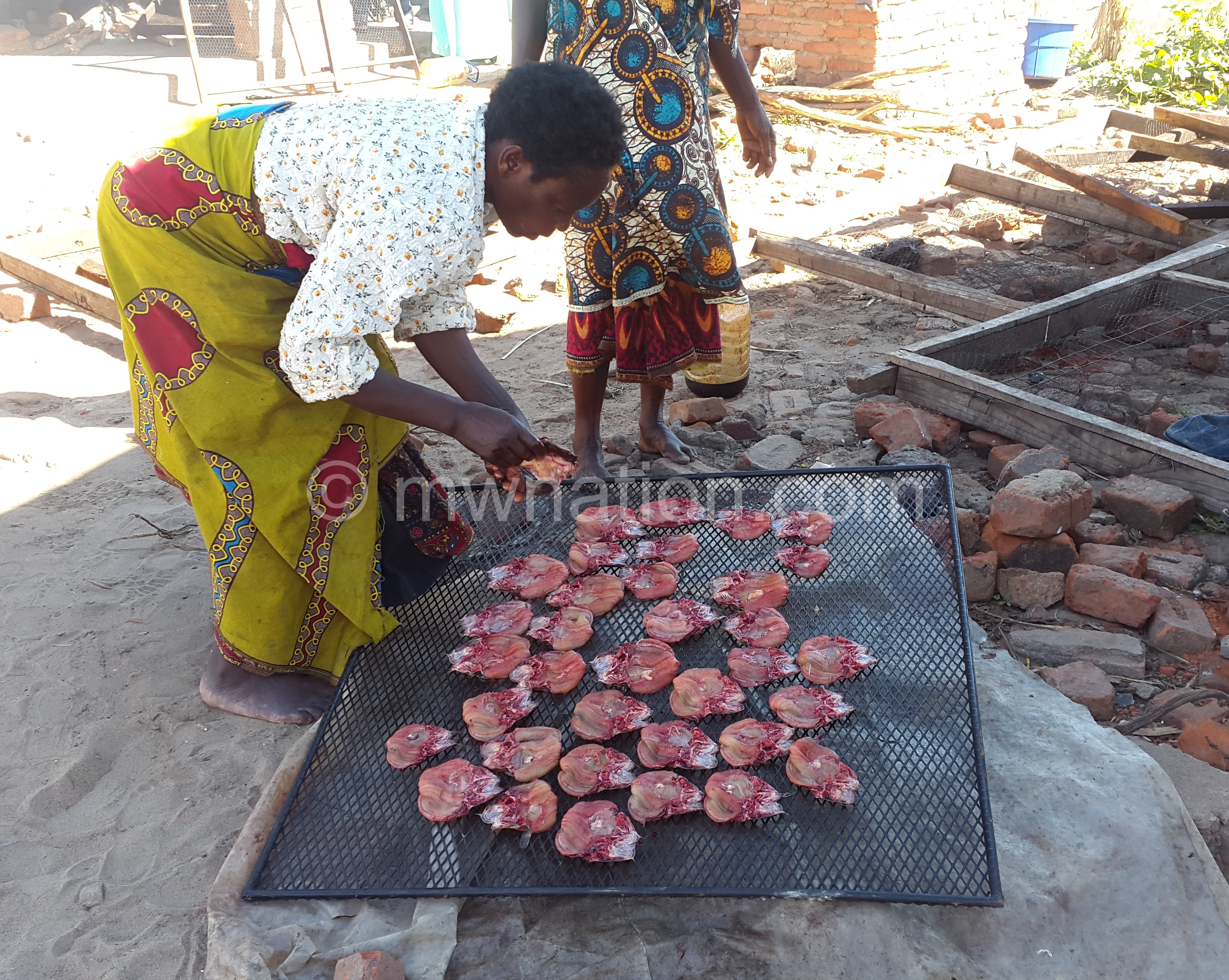Post-harvest fish losses, solved puzzle
In Malawi, fishing is an important source of employment and nutrition—about 70 percent of the animal protein in people’s diets—but still 40 percent of fish are lost during processing.
Once caught, most fish are sun-dried, smoked or parboiled. However, the period when fishermen catch a lot of fish overlaps with seasonal rains and high humidity, which interfere with drying and smoking.

Open drying of fish also results in insect infestation, dust accumulation, and contamination by animals. Smoking of fish, done in open fires, usually leads to high levels of smoke deposit thereby compromising the quality of the fish.
Ethel Kabwerebwere, chairperson for Kachulu Women Fish Processors in Likapa Village, Traditional Authority Mwambo in Zomba recall of days when the group was losing fish due to poor processing methods.
The women, 16 in total, buy fish from fishermen on Lake Chilwa in Zomba, they add value and preserve the fish through methods such as drying and smoking. They resell the fish at a far better price.
“Previously, after buying fish, we were sun drying and smoking on open fire. When drying our fish in the open, most of the fish were getting damaged; some were being blown off by the winds while the rest were accumulating dust.
“The situation was worst during the rainy season. Our fish were rotting. We were ending up throwing them away. When smoking on open fire, the fish were of low quality. They were not marketable too,” says Kabwerebwere.
New drying methods
However, since 2010, things have changed. The women are realizing value for every fish they buy. They are processing their fish using improved technologies. They are also adding value to their fish such that when they go to the market for sell, the fish sells like hot cake.
This is because of the Lake Chilwa basin Climate Adaptation Programme. It is being implemented by the WorldFish Centre, Leadership for Environment and Development Southern and Eastern Africa (Lead SEA), the Department of Fisheries and the Forestry Research Institute of Malawi (FRIM) in Zomba, Phalombe and Machinga.
The programme has a number of components. The component dealing with women fish processing groups is facilitated by WorldFish Centre. Its objective is to enhance adaptive capacity through fish processing. Among others, the component seeks to improve traditional methods of processing fish in order to increase quality and reduce wastage.
Kabwerebwere says in 2010, the joint programme, which is being implemented with funding from the Norwegian Government, built a pilot solar fish-drying tent for them. The women were told to try drying their fish in the tent to compare with their old ways.
Rose Kamata, a member of Kachulu Women Fish Processors, says the women noted that their fish were taking just a day to dry in the solar tent. Also, no fish were getting damaged. It were of good quality.
“When going together with our friends who were still drying their fish in the open to the market, ours were selling fast. We reported back to the implementers. They then built four big solar fish-drying tents which we use to dry small fish such as usipa. They also introduced improved smoking kilns which we use for big fish such as milamba and chambo.
“Apart from that, they trained us on proper handling of fish and how to add value to the fish. Since we started using these technologies and value addition tips, every fish counts. The only problem we have now is we are only getting one type of fish, mulamba. Matemba and Chambo are now extinct due to the drying up of the lake,” says Kamata.
Increased income
Village Headman Likapa testifies that through the use of the solar tents and improved smoking kilns, the lives of the women have improved. They are making a lot of money on a few fish.
“Previously, no matter the quantity of the fish, the women were selling at a low price because the fish were of low quality. But now things have changed.
“For example, now they sell three buckets of fish at around K60 000 to K70 000. Previously they were selling the same fish at K6 000. They even have markets in the city (Blantyre),” says Likapa.
Just as Kachulu Women Fish Processors in Zomba, other women fish processing groups from Phalombe and Machinga have also benefitted from the Lake Chilwa Climate Change Adaptation Programme.
Changing lives
The main objective of the programme is to secure livelihood of the over 1.5 million people living in the Lake Chilwa Basin and enhance the resilience of fish, a natural resource they depend on.
“The solar tents driers and the improved energy-saving fish smoking kilns have proved to be of great importance to the women and other people who are using them.
“We are seeing a reduction in fish losses. Quality fish is also coming out from the two technologies,” says Asafu Chijere, a researcher at WorldFish Centre.
Chijere added that the income generated from sales of the fish is huge. The women have opened individual and group bank accounts. They have also created village savings and loans (VSL) groups which are assisting them in having a savings culture.
He adds: “Some have educated their children; others have bought livestock and poultry while others are using money from fish business to grow rice.”





